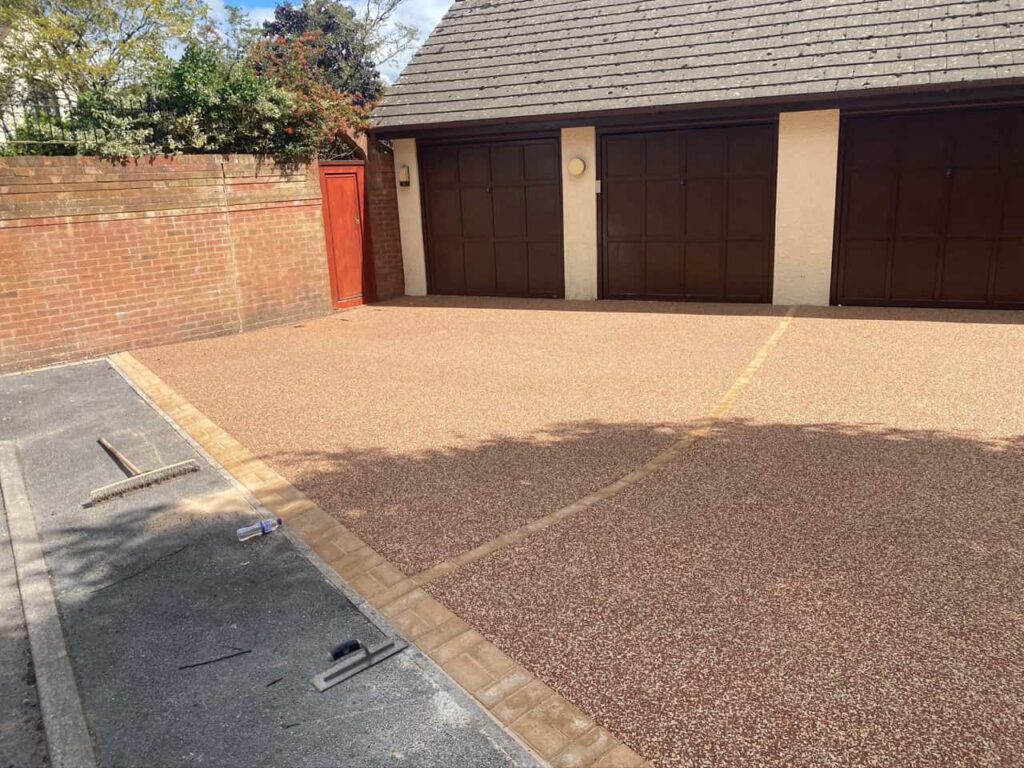Farm Road Resurfacing: When to Choose Tar & Chip Over Traditional Materials
Resurfacing a farm road requires careful consideration of both durability and cost-effectiveness, especially when dealing with heavy traffic from machinery and vehicles. One option that offers a balance of affordability and performance is tar and chip surfacing. At Gillingham Driveways, we specialise in providing high-quality resurfacing solutions for farm roads in Gillingham, Kent. In this post, we’ll explore why tar and chip can be a practical alternative to traditional materials like asphalt and concrete, and when it’s the right choice for your farm road.
What is Tar & Chip Surfacing?
Tar and chip surfacing, also known as chip seal, is a method that involves applying a layer of hot liquid tar onto the road surface, followed by the spreading of loose aggregate or stones. The stones are then pressed into the tar with a roller to create a textured surface that offers both grip and durability.
This method has been used for many years and is particularly suited to rural and farm roads due to its cost-efficiency, long-lasting performance, and ability to withstand varying weather conditions.
Benefits of Choosing Tar & Chip for Farm Roads
1. Cost-Effective Solution
One of the primary advantages of tar and chip is its affordability. Compared to asphalt or concrete, tar and chip requires fewer materials and less intensive installation, making it a budget-friendly option for resurfacing long stretches of farm roads. For farm owners who need a durable surface but want to keep costs manageable, tar and chip offers an ideal balance between cost and performance.
2. Durability and Resistance
Farm roads need to handle heavy loads, from agricultural machinery to delivery vehicles. Tar and chip surfacing provides a tough and resilient surface that can withstand frequent use and heavy traffic. The layer of aggregate on top offers protection to the underlying tar, preventing it from wearing down quickly and offering long-term resistance to cracking or deformation under pressure.
3. Improved Traction
The textured finish of a tar and chip road offers better traction than smoother surfaces like asphalt. This makes it especially useful for farm roads, where muddy conditions or wet weather can create slippery surfaces. The rough texture helps vehicles maintain grip, reducing the risk of skidding, even during adverse conditions.
4. Low Maintenance
Tar and chip requires relatively little maintenance compared to other materials. The top layer of stones helps protect the tar from exposure to UV rays and weathering, reducing the need for frequent repairs. Over time, some stones may become dislodged, but these can be easily replaced, keeping maintenance costs low.
5. Rustic Appearance
For farms and rural properties, aesthetics are often just as important as functionality. Tar and chip surfacing provides a natural, rustic appearance that blends well with rural landscapes. The gravel finish can be customised with different stone colours and sizes to suit the overall look of the property, adding to its appeal without sacrificing durability.
When to Choose Tar & Chip Over Traditional Materials
While tar and chip is a versatile and durable option for farm road resurfacing, there are specific scenarios where it’s particularly advantageous:
1. Rural Settings
In rural areas like Gillingham, Kent, tar and chip is often preferred over asphalt or concrete due to its natural appearance and ability to blend seamlessly with the surrounding environment. It’s an excellent choice for farm roads that don’t require the highly polished finish of asphalt but still need a durable surface.
2. Cost-Driven Projects
For farm owners looking to resurface long stretches of road without breaking the bank, tar and chip offers significant cost savings. The lower material and installation costs make it an ideal solution for large properties where budget constraints are a key concern.
3. Heavy-Duty Use
Farm roads are subjected to heavy-duty use, and tar and chip is more than capable of withstanding the demands of agricultural vehicles and equipment. The added traction and durable surface ensure that the road remains functional and safe for daily use, even under significant weight and traffic.
4. Weather Resistance
If your farm road is exposed to harsh weather conditions, tar and chip’s textured surface offers better protection against rain, frost, and heat compared to asphalt. The rough texture helps water drain more effectively, reducing the risk of standing water or ice forming on the surface, which can be especially important in rural areas.
Conclusion: Trust Gillingham Driveways for Your Farm Road Resurfacing Needs
Choosing the right material for resurfacing your farm road is essential to ensure long-term durability, safety, and cost-efficiency. Tar and chip surfacing is a practical solution that combines affordability with reliable performance, making it an excellent choice for farm roads in rural settings like Gillingham, Kent.
At Gillingham Driveways, we have extensive experience in tar and chip installation and are dedicated to delivering high-quality results that meet your specific needs. If you’re considering resurfacing your farm road and want a solution that balances cost, durability, and appearance, contact Gillingham Driveways today to learn more about our tar and chip services. Let us help you keep your farm road in top condition for years to come.
Call us on:01634 564 190
Click here to find out more about Gillingham Driveways
Click here to complete our contact form and see how we can help with your driveway needs.

